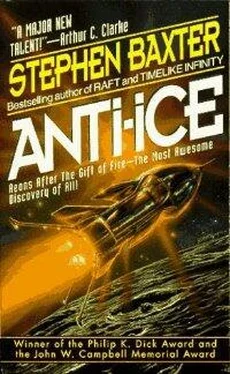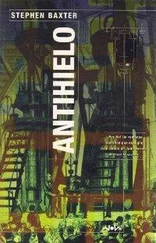Stephen Baxter - Anti-Ice
Здесь есть возможность читать онлайн «Stephen Baxter - Anti-Ice» весь текст электронной книги совершенно бесплатно (целиком полную версию без сокращений). В некоторых случаях можно слушать аудио, скачать через торрент в формате fb2 и присутствует краткое содержание. Год выпуска: 1993, ISBN: 1993, Издательство: Collins, Жанр: Фантастика и фэнтези, на английском языке. Описание произведения, (предисловие) а так же отзывы посетителей доступны на портале библиотеки ЛибКат.
- Название:Anti-Ice
- Автор:
- Издательство:Collins
- Жанр:
- Год:1993
- ISBN:978-0-246-13835-4
- Рейтинг книги:5 / 5. Голосов: 1
-
Избранное:Добавить в избранное
- Отзывы:
-
Ваша оценка:
- 100
- 1
- 2
- 3
- 4
- 5
Anti-Ice: краткое содержание, описание и аннотация
Предлагаем к чтению аннотацию, описание, краткое содержание или предисловие (зависит от того, что написал сам автор книги «Anti-Ice»). Если вы не нашли необходимую информацию о книге — напишите в комментариях, мы постараемся отыскать её.
Anti-Ice — читать онлайн бесплатно полную книгу (весь текст) целиком
Ниже представлен текст книги, разбитый по страницам. Система сохранения места последней прочитанной страницы, позволяет с удобством читать онлайн бесплатно книгу «Anti-Ice», без необходимости каждый раз заново искать на чём Вы остановились. Поставьте закладку, и сможете в любой момент перейти на страницу, на которой закончили чтение.
Интервал:
Закладка:
But never before had I been served by a waiter who swam through the air like a fish.
Pocket was allowed to sit with us to eat, as there was no separate galley or kitchen.
When Pocket had cleared away the debris we sat in the silence of the Smoking Cabin, sipping at our port and watching Earthlight slant through the smoky air. Holden said, “I have to congratulate you on your table, Sir Josiah. I refer both to the quality of the provision, and to the ingenuity with which you have arranged your galley.”
“Hydraulic presses, that’s the secret,” Traveller said comfortably, and he stretched his long legs out in the air before him. “The food is prepared in a decent restaurant in London I favor from time to time—and then rapidly dried out, in hot ovens, and compressed into those packets you observed. The result is a small, compact bundle which can be stored for some weeks without spoiling, and which requires the application of only a little heat and water to be reconstituted into a fine meal.”
“Remarkable,” I observed. “And I would hazard that there are many more such meals stored in the walls of this vessel?”
“Oh, yes,” Traveller said. “We have some weeks’ provisions.”
Holden relit his cigar. (I noticed how oddly match flames behaved in this falling condition; the flame clustered in a little globe around the head of the match, and would extinguish itself rapidly if one did not draw the match gently through the air to new regions of oxygen.) The journalist said, “I am relieved that we are in little danger of starving to death. But perhaps this is the moment at which we should discuss the provisions available to us in general.”
The thought of starvation had not entered my limited imagination before that moment; but of course Holden was right. After all we were lost in a cold, desolate void, with only the contents of this fragile vessel available to sustain us. I reflected guiltily now on my enjoyment of the meal; perhaps we should already have entered a regime of rations.
“Very well. As for water,” Traveller said, “we carry several gallons.” He thumped the floor with one bony foot. “It is contained below, in a series of small tanks. One large tank would be unsuitable, you see, for as the craft flies there would be a danger of the water sloshing about—”
“Several gallons hardly sounds a lot,” I said uneasily. “Especially since I’ve already run a bath.”
Traveller smiled. “You need not worry, Wickers; bathing water is passed through a series of filters and pipes which enable it to be used several times over. It is fit to drink, even after four or five filterings.” He laughed at our expressions. “But the water we use in the closet—which Pocket will show you later—is vented directly, you will be relieved to hear, from the hull of the craft.” Then his expression melted to one of worry and calculation. “Nevertheless water remains our problem. For water is used as our reaction mass, and I very much fear that our Prussian friend may have expended rather too much of it for comfort.”
I would have asked for a discourse on this worrying mystery, reaction mass, but Holden was leaning forward urgently. “Sir Josiah, what of air? This is a small vessel. How can four men—or five, counting the Prussian—survive here for more than a few hours?”
Traveller waved a long-fingered hand languidly. “Sir, you need have no concerns. Once more an ingenious—if I may say so—filtering system is in operation. In one hour a healthy man will absorb the oxygen contained in twenty-five gallons of air, and replace it with carbonic acid, useless for respiration. A pump works continuously to draw the air from this Cabin—and the Bridge—through grilles. The air is passed through potassium chlorate, at a temperature several hundred degrees above room temperature; the chlorate decomposes to the chloride salt of potassium and releases oxygen to replenish the stale air. And then a measure of caustic potash is applied, which combines with the carbonic acid, so removing it from the air.
“We have stocks of the relevant chemicals sufficient to sustain life for several weeks.”
“Ah.” Holden nodded, evidently impressed.
“As for heat and light,” Traveller went on, “acetylene burners power the lamps above our heads, and also heat air which is passed through pipes embedded in the hull of the craft. In fact, bathed as we are in relentless sunlight, it is not cold which is our problem but the danger of being cooked. Hence the slow rotation of the craft which you have observed, and which serves to spread the burden of the sun’s radiation over all parts of the ship’s hull.”
“Then,” I said, “you see no obstacle to our surviving and returning safely to our home world.”
“I did not say that, Ned.” His cigar extinguished, Traveller lit up one of his preferred Turkish concoctions. “I designed the Phaeton to conduct observations in the upper atmosphere of the Earth. I even hoped one day to bring it into Earth orbit.” (This concept, which was new to me, was explained later by Holden; it involves the continual falling, under the influence of gravity, of a body around a planet, much as the Little Moon circles the Earth.) “But,” Traveller went on, “the Phaeton is not designed for a flight into deep space.”
He went on to describe the principles of the marvelous craft’s propulsion system. Anti-ice stoves, it seemed, were used to heat steam to monstrous temperatures. But instead of directing the expansion of the hot gas to a piston (as in the design of the land liner’s drive system), pipes led the steam to the nozzles I had observed affixed to the base of the craft, whence the steam was expelled. By hurling the superheated steam away from itself, the Phaeton drove itself forward. Thus a skater may push away his companion; the companion slides away across the lake, but the skater himself is impelled backwards by the reaction force. This is the principle of the rocket, and the “reaction mass” mentioned earlier by Traveller was the steam hurled away by the rocket.
This steam emerged from its nozzles at many thousands of miles per hour.
But even so, to enable the craft to move forwards with an acceleration of twice that due to Earth’s gravity, a full four pounds of water had to be lost to space every second.
Holden nodded gravely. “Then the weight of the completed craft can be no more than two or three tons.”
Traveller looked briefly impressed. “The weight of the craft is clearly at a premium,” he said. “And that drove my selection of aluminum as the principal construction material of the hull. It is far lighter than any iron alloy, or steel, despite its absurd price—a full nine sovereigns a pound, as compared to two or three pennies for cast iron.”
“Good Lord,” Holden said.
“My choice of water for the reaction material was driven by its wide availability and cheapness—even if the Phaeton were to crash into the sea, a tankful of brine would suffice to get me airborne again.”
I gestured to the darkened windows. “But there is no ocean out there.”
“No. We have only what remains in our tanks. And, although I cannot be sure without access to the Bridge, there lies our problem. I very much fear that our Prussian host may have exhausted our supply beyond the point at which we can turn the ship around and reverse its flight from Earth—and even if we could, there may be nothing left to work the rockets so that we could land in a controlled fashion, and not plummet like some meteor into the landscape.”
I shivered at these words, and crushed the port bulb in my hand.
6
EVERYDAY LIFE BETWEEN THE WORLDS
In our interplanetary capsule we were bereft of day and night—or rather of the Earth’s diurnal rhythms, which had been replaced by the rotation of the Phaeton; if one cared to, one could watch a sunrise every quarter of an hour. But we kept to much the same hours as if we were firmly on English soil. We slept on pallets which folded down from the walls of the Cabin. My bed, into which I bound myself each night with tightly tucked blankets, supported me as if with the softest of mattresses—although, if I worked an arm free in my sleep, it was disconcerting to wake to find it floating before my face, apparently disembodied.
Читать дальшеИнтервал:
Закладка:
Похожие книги на «Anti-Ice»
Представляем Вашему вниманию похожие книги на «Anti-Ice» списком для выбора. Мы отобрали схожую по названию и смыслу литературу в надежде предоставить читателям больше вариантов отыскать новые, интересные, ещё непрочитанные произведения.
Обсуждение, отзывы о книге «Anti-Ice» и просто собственные мнения читателей. Оставьте ваши комментарии, напишите, что Вы думаете о произведении, его смысле или главных героях. Укажите что конкретно понравилось, а что нет, и почему Вы так считаете.












